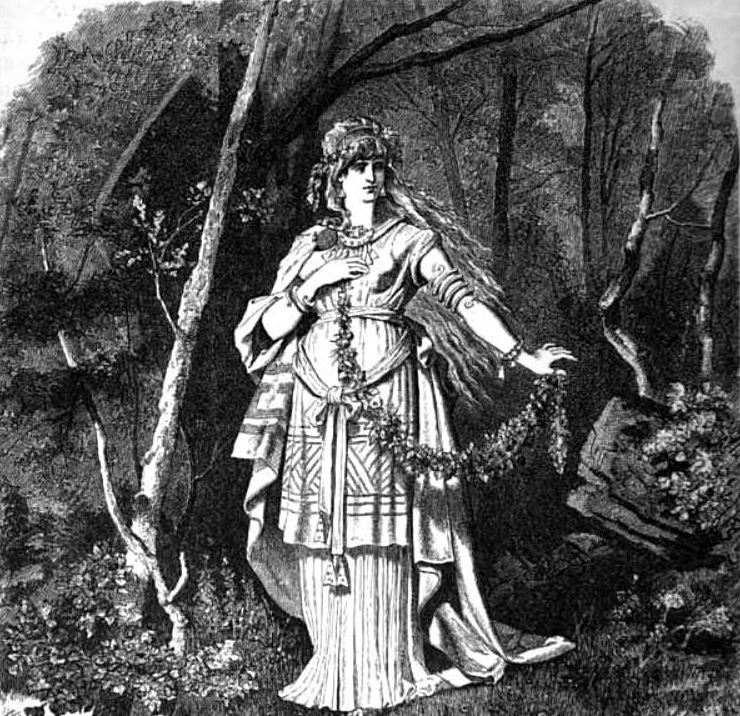A völva is a soothsayer, female shaman, or seeress in North Germanic and Norse paganism, i.e., a woman able to predict future events and practice sorcery. Examples of völva in Norse Myth include Frigg and especially Freyja.
How do you Pronounce Norse Völva?
Völva or vǫlva was pronounced “vul-va” by the Old Norse and the Icelandic.
Völvas: Facts and History
The term völva means “wand carrier” or “staff bearer,” Its etymology is similar to early Germanic seeresses Waluburg and Ganna. The use of staffs and wands in divination and clairvoyance during the Viking age originated in the classical era.
The most famous völva goddess in Viking society was Freyja. Not only was she the goddess of seiðr (Norse magic), but love, fertility, beauty, sex, gold, and war.
The legends of völvas probably arose from women who would roam from settlement to settlement, performing magic tricks, selling “lucky” trinkets, or delivering prophecies in return for food, shelter, and clothing.
Völva Persecution
In Norse society, a völva commanded respect, but as the Viking age ended, the rise of Christianity saw widespread persecution of the völvas as evil doers.
Practitioners of seiðr were ridiculed in Asgard, although Odin himself became an avid user of the form.

Powers of the Völva
Maybe the best-known völva, Freyja (Vanir goddess of lust, love, battle, and magic), practiced a form of Norse magic called seiðr, which has associations with effeminacy, something some Asgardians found worthy of mockery. While Æsir magic tended to be powerful in a warlike way, the Vanir and seiðr way was softer and more specialized.
These magical practices may also have provoked Asgard into attacking Vanaheim in the first place.
Masters of the magic of seiðr (“to bind” in Old Norse) could cast love charms, bring forth storms and invoke nightmares.
After the culmination of the Æsir and Vanir war, a truce decreed an exchange of hostages, with Freyja being one of the Vanir gods and goddesses sent to live in Asgard. Although, as we have read, there was some resentment towards the use of seiðr, the supreme god Odin was the keenest to learn the new way despite its feminine associations.
Of course, Odin was well-known for the extremes he would go to when obtaining knowledge (see his adventure with Mimir).
Nevertheless, Loki taunts Odin for his use of the magic in the Lokasenna (The Flyting of Loki or “Loki’s Verbal Duel”).

Soothsaying Ritual
Völvas were primarily sorceresses and fortune tellers. They learned to undergo a shamanic ritual to see into the future.
The process involved younger völvas invoking a spirit incantation which enabled the witch to enter a trance-like state and allow her to converse with spirits and gods. Suspended between the two planes, the völva could predict future occurrences and give prophecies.
Völvas were well known for carrying henbane seeds. When burned, these seeds produced a hallucinogenic effect and could have been used in these rituals.
Healers
Völvas were also healers; Groa uses her powers to heal Thor when he is injured journeying through Jotunheim.
Seeresses and cats
Cats and their fur and skin are constant companions of seeresses. In Eiríks saga rauða, the renowned Norse sorceress Þorbjörg lítilvölva wore a dress with a black lambskin hood lined with white cat fur and gloves made of catskin.
English folklorist Hilda Roderick Ellis Davidson (1914-2006) postulates that cats and related objects represent how seeresses invoked the spirits of animals to help them disseminate magical powers and obtain knowledge from distant realms.
Neil Price, an English archaeologist specializing in Viking Age Scandinavia, points out that Thor presented Freya with two cats which she used to pull her chariot.
Völva stories in The Poem Völuspá
Excerpts of the poem Völuspá (or Vǫluspá) appear in the Prose Edda, the 13th-century work by Islandic politician, historian, and poet Snorri Sturluson and the collection of ancient Scandinavian poems of the same time called the Poetic Edda.
The Seeress’ Prophecy
One of these poems is The Seeress’ Prophecy, in which a seeress receives a visit from an older man. As the man questions her about the destiny of the nine realms, she sees he has only one eye and immediately realizes he is Odin (Odin had given up one of his eyes in return for receiving words of wisdom from the sage giant Mimir).
Odin gives the soothsayer a necklace and ring in return for her information. She tells him about the world’s creation but, more importantly, about Ragnarök, the Norse “End of Days” when monsters and giants defeat the gods in battle. She revealed that the survivors of the war would rebuild the world, although the presence of evil would continue.
Heiðr
Heiðr is also known as Heith, Hed, Hetha, or Heid from the Old Norse “bright” or “honor.” She is described as a witch in a stanza of Völuspá during her recounting of the war between the Æsir and the Vanir:
Heith, they named her
Translation by Henry Adams Bellows (1936) from sacred-texts.com
who sought their home,
The wide-seeing witch,
in magic wise;
Minds she bewitched
that were moved by her magic,
To evil women
a joy she was.
She appears again in the Poetic Edda in the Hyndluljóð. Heiðr may be an alias of the witch Gullveig, mentioned in the previous stanza. Although many sources suggest Heiðr is Freyja, some argue the völva reciting the poem was referring to herself.
A völva with the name Heiðr also appears in Landnámabók, Hrólfs Saga Kraka, and Örvar-Odds Saga, where she foretells Örvar’s death.
Norse Words with Similar Meanings to Völva
The sorceress Þorbiorg in the saga of Erik The Red’s journey to North America or Eiríks Saga Rauða is called a vǫlva, spákona, and vísendakona. These words probably used to have different meanings but meant the same thing when the tales were written. A little like “witch” and “sorceress” are interchangeable in modern language.
The root galdr (spell or incantation) forms the roots of four other words associated with witchcraft:
- Galdrasnót (“galdr lady”)
- Galdrakonur (“galdr women”)
- Galdrakerling (“old galdr woman”)
- Galdrakind (“galdr creature”)
The word völva is also possibly a synonym of norn. A norn was a deity in the Nordic myth that could change the fate of humans.

